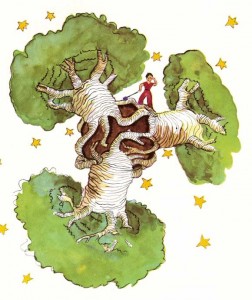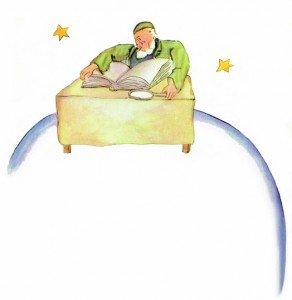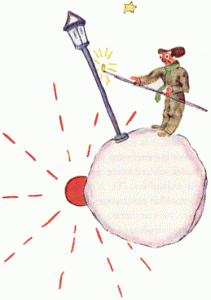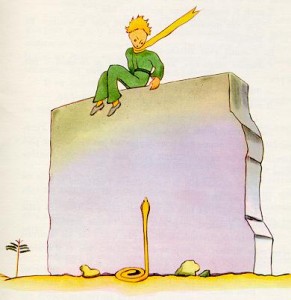The Six Friends You Should Force to Read The Little Prince
CHOOSE YOUR OWN ADVENTURE: INTRODUCTION
A1. If you consider yourself an adult, read the following introduction to this week’s book club book.
B1. If you consider yourself a child, skip down to the train of stars and sparkles (a matter of my personal taste, alright?) to read an alternate introduction.
A2. The Little Prince is not an obscure, unobtainable book. It sells as many as a million copies every year, and there are 140 million copies of the book floating out there in the world. It’s been translated into a truckload of languages. There are more than 40, and perhaps up to as many 350 separate translations of the book in Korean. It’s one of the few books to have been translated into the dead language Latin. To quote directly from Wikipedia,
“In 2005, the book was also translated into Toba, an indigenous language of northern Argentina, as So Shiyaxauolec Nta’a. It was the first book translated into this language since the New Testament of the Bible.”
It’s safe to say that this book is important and applicable to a wide swathe of humanity. Nonetheless, there may be some people in your circle of friends that haven’t taken the time (literally a couple of hours on a Saturday) to read through this thin, but heavy book. So, without further ado, feel free to skip over the “children’s” introduction below and get on to the list of The Six Friends You Should Force to Read The Little Prince and why.
B2. ☆*:・゚✧*:・゚✧*:・゚✧*:・゚✧*:・゚✧☆
I made sure that today, this Saturday, was my day. I woke up, ate a bowl of soup that made me think about the guy who taught me how to make it, how I might make it when I get home, whether my mom would like it. I lay in bed with my cat by my calf and read through The Little Prince one more time. And on page 59, I burst out into tears on my bed while my cat slept soundly. This book is about sharing, about widening the path of your human love and tragedy, and I think the following six of your friends would be happy to join in the company of those who look up at the stars and maybe hear laughter.
THE LIST
1. The One Who is an Academic Workaholic —

For every new reader, there needs to be something in this book that they will enjoy to temper the difficulty of swallowing something they may not be so ready to accept. Luckily for the Academic Workaholic, the little prince speaks to them very early on. He tells a story of his small planet — one so small that you can see the sunset forty-four times in a day, if you’d like. For a planet so small as this, one must be diligent to uproot and dispose of the baobab seeds before they destroy the planet, as they did on the planet of the lazy man to the right.
The little prince says, “Dear Academic Workaholic, you are right. We need to be diligent. Beware the baobabs.”
But later, on page 37, we arrive at the fourth planet and the home of the business man who counts the millions of stars he can see because he “owns” them. Your Academic Workaholic Friends need to read this book to be reminded that occupying themselves with meaningless activities can steal their entire lives away. Not every pursuit is meaningless, but it is easy for someone who strives for quality to waste their energy on bringing quality to an effort that doesn’t deserve it. The business man counts his stars well. He says,
“I am concerned with matters of consequence: I am accurate.”
Be accurate. Chase excellence. But don’t be blinded to the possibility of wasting your life counting stars.
2. The One Living Alone for the First Time —

Our society is designed in a way that, ideally, we are surrounded by support, help, and friends until sometime during or after college, when we’ve 20 years of life under our belts. It seems that in 20 years we might learn enough about the ways people have taken care of us to take care of ourselves, but more often than not, it doesn’t work out that way.
Living on your own for the first time is hard. You no longer get to live in a glass case, surrounded by the warmth of your family, the security of your school, and the constant support of your friends. You have to go to work. You have to live in the world at large and deal with people you were once able to pretend into non-existence.
When you give The Little Prince to your friend as a moving-out present, they will find solidarity with the rose left behind on B-612. Because a lot of time when we go out in the world, we have to put up thorns. We push away opportunities to keep ourselves safe or binge on opportunities to keep ourselves from being scared. If we’re honest with ourselves, at some point we realize “[t]he flowers have been growing thorns for millions of years. For millions of years the sheep have been eating them just the same”, and that it’s not really working.
The little prince’s rose realizes that putting up walls or affectations is not the way to be happy. Just as the prince is about to step off the planet for his journey, she understands a truth about being self-sufficient:
“I must endure the presence of two or three caterpillars if I wish to become acquainted with the butterflies.”
3. The One Who Thinks No One Is Worthy of Their Time —

It’s good to have a sense of self-worth, especially when so many people grow up relying on others to provide that sense for them. That was how I grew up, until I discovered Atlas Shrugged and bought into the idea that I alone was worthy of my time and effort, and no one could take away my mind or what I could create there. I felt independent, strong, and confident.
But later I felt lonely. I had put myself in a position where I was unable to make new friends because I believed I was worthy of a certain level of quality in a friendship. I hated and didn’t understand small talk; I wanted to progress directly to the rewarding stage of deep talk and understanding. So I complained about the lack of quality in the people that surrounded me. It struck me particularly clearly one day when I whined to my boyfriend about how I hated hearing the people next to us talk about their days drinking at college. And he just asked me, “Why?” I realized I’d built up my own walls for myself.
So when reading through The Little Prince this time, I stumbled upon the following line and a world opened up.
“Yes,” I said to the little prince. “The house, the stars, the desert– what gives them their beauty is something that is invisible!”
Indeed. The stars were just stars until we learned the little prince lived there. The desert was just a desert until they had the hope of finding a well over the next sand dune. The pilot’s house would have been only a house if there hadn’t been the rumored promise of treasure hiding somewhere inside. It’s the same with people. People aren’t very beautiful when taken at face value, but the fight for friendship is a fight worth fighting because somewhere inside someone, maybe over the very next sand dune, is the true connection you are looking for.
4. The One Who Dreams About Travelling —

You know the one. The one who sits in their room building itineraries for day trips to France, but have made no steps toward getting a proper passport or raising money. The ones who live by flipping through guidebooks and hearing other people’s recommendations. That one? Direct that friend directly to chapter 15 to read about the geographer.
There are plenty of obvious mirrors in the book: the king, the conceited man, the drunk. Flaws become clearer when you see yourself reflected, so of course this book might change something in the lives of false authorities, narcissists, and unaware addicts. The geographer, however, is a more difficult mirror to see into. At first glance, he doesn’t seem at all like the travel dreamer: he doesn’t care about whether he travels or not, doesn’t mention tourist spots or man-made features. But he dismisses the greatest part of travel because he claims geographers only “write of eternal things” (p. 44).
When you travel, it is the ephemeral that sticks with you long after you arrive home. That’s why when you pull out slideshows of your pictures or try to explain how the trip changed you, you end up falling short. The beauty of the little prince’s planet is his flower, which the geographer refuses to record because it is not forever.
You will never experience the beauty of the world if you do not step on that boat or train or plane and move. The beauty that comprises a country or town is not the everlasting formations, but the life and personality of the people. And you must go to a person’s home to really know that person.
5. The One Who Believes in Outdated Traditions —

If you have a grandparent who is stuck on traditions that no longer make sense or go to the point of being harmful, you should make a special effort to talk with them about the lamplighter.
The lamplighter’s life started long ago when he was given perfectly reasonable orders. He would light the lamp at night and snuff it out when the sun came up. He was happy to do his duty and lived well. But change happens. It happens slowly and surely. Over time, the rotation of the planet where the lamplighter lived became faster and faster, until he was snuffing the light with one hand and lighting it with the other, not a moment to sit or to sleep.
It’s impossible not to pity the man who cannot sleep. The little prince admires him, because he thinks of someone other than himself and does his duty, but reflect a little longer on the person who sent down such orders and who lets the lamplighter continue to suffer without revision of the rules. If the conditions seem absurd, consider the absurdity of the person who defined them. Time requires some change.
6. The Sad One You Don’t Know How to Comfort —

And lastly, perhaps the one who will benefit the most from reading The Little Prince, is a friend you love and care about, but maybe just can’t reach. Often they are mourning the loss of a person — whether through death or separate growth — and you don’t know what words will help heal their wounds best. Hand them the book and let the sunsets, the fox, and the snake take care of them.
They may know when the prince fails to answer the pilot’s question about sunsets.
You can see the day end and the twilight falling whenever you like. . .
“One day,” you said to me, “I saw the sunset forty-four times!”
And a little later you added:
“You know– one loves the sunset, when one is so sad. . . ”
“Were you so sad, then?” I asked, “on the day of the forty-four sunsets?”
But the little prince made no reply.
They may know when they read the fox’s monologue on page 58, then burst out to tears because of the poignancy of his later line:
“But now you are going to cry!” said the little prince.
“Yes, that is so,” said the fox.
“Then [being tamed] has done you no good at all!”
“It has done me good,” said the fox, “because of the color of the wheat fields.”
They may know when the snake brings their thoughts to life in one breath.
“Where are the men?” the little prince at last took up the conversation again. “It is a little lonely in the desert. . . ”
“It is also lonely among men,” the snake said.
But at some point in the journey through The Little Prince, your sad friend will have a small feeling that they are not alone, and that their grief is okay. “It is such a secret place, the land of tears”, but it is well-traveled.
Once you’ve finished passing out copies of this well-read, well-loved book, hop on down to the comments section to see some questions I have about the book or to start your own discussion. I’ll see you there.










So, my first question is kind of embarrassing, but I can’t fathom why in the universe the Little Prince loves the rose. She shows up and she gives him no benefit but that he has to take care of her. She’s mean and vain and silly, and it’s not until he’s about to leave that she says she loves him, too. What’s up with this situation? I tried to think about a real-life relationship I knew of that was related to this fictional one, but I couldn’t come up with one. It only reminded me of Gone with the Wind. So what’s the deal with these two? Do you know how to explain to me why he loves her?
I feel like the rose is just the image of people you love but who aren’t considerate. She’s learning to love as he is deciding to expand himself. I don’t mind him loving her, although I also didn’t like her much – I don’t like that she takes so long or that she is so inconsiderate of the prince’s love. But I think that there are lots of people like her out there, and this is another example of how wonderful the prince can be, and of how we can all change over time.
”I must endure the presence of two or three caterpillars if I wish to become acquainted with the butterflies.”
You attribute this to self sufficiency, but I see it more as a confession of understanding, about being accepting to the small annoyances to find the beauty.
I also wanted to talk about the chapter about the king. On the one hand, the Little Prince says he a good person because he only gives reasonable orders. But if we look at him, we think he’s a ridiculous king because he changes every single one of his orders to what would have already happened.
What’s silly is this reminds me of when I was little and pretended to be a witch. I taught my sisters they could make the crows fly off the telephone wires, but if they didn’t fly it was just because they did it wrong. What does the book say about this kind of non-authority? I kind of balk against it because it makes no real change. Does The Little Prince advocate against authority?
I think the Little Prince rather advocates against rigid ideas – the king changes his mind but he has the ability to, and he uses it. We all have such a capacity to alter our opinions and our stations in life, make choices and then alter them, but we so very rarely do so. Why can’t the king change his mind and have us appreciate it? I suppose at the same time it’s an indication that it doesn’t matter what we do, the outcomes will be what they are regardless? That’s a more intimidating suggestion about fate and our inability to avoid it though!
And last before y’all hop in, I just wanted to pull out this quote:
“What is a rite?” asked the little prince.
“Those also are actions too often neglected,” said the fox. “They are what
make one day different from other days, one hour from other hours.”
What rites do you have in your life and do you realize how significant they make the way you pass time?
Just kidding. I noticed the opening of the chapter on p.47 in the PDF, with this quote:
“The Earth is not just an ordinary planet! One can count, there 111 kings (not forgetting, to be sure, the Negro kings among them), 7000 geographers, 900,000 businessmen, 7,500,000 tipplers, 311,000,000 conceited men– that is to say, about 2,000,000,000 grown-ups.
To give you an idea of the size of the Earth, I will tell you that before the invention of electricity it was necessary to maintain, over the whole of the six continents, a veritable army of 462,511 lamplighters for the street lamps.”
And it made me suspicious. Look at all those figures. Only adults care about figures. Luckily, those big numbers made me bored and I skipped the paragraph to find the next part of interest. Did you react like a child or an adult?
I found this quite interesting. I’m sure when I read this as a kid I just skipped past the big figures, reading this more recently I also sort of just skipped past it and didn’t pay much attention.
I also found it quite interesting about how Saint-Exupéry shows the differences between the children and grown ups. The grown ups are shown as really boring and unimaginative- such as the businessman and geographer he met on the different planets. But then the children are so much more inquisitive and innocent. However the Little Prince continues to ask lots of questions and shows the signs of what the narrator says a child should be- reminding the narrator of what it means to be a child.
I think one of the main points is that it’s not so much about what age you are, but it’s how you see the world. I talked about it a little bit in our discussion about The Great Gatsby, how when we’re younger we think it’s normal to love so blindly and naively, but after a while we might grow up and look back at love like that as childish. We lose the understanding of a child’s love. In The Little Prince, there’s a love that reminds me of that — it’s naive and simple. What’s sad to me is that I can understand the naive love in The Great Gatsby, a book written for adults with no pretense of going back, but not in The Little Prince, a book trying to save us from that kind of cold adulthood.
Arctic, up above I asked about the prince’s love with the rose. Do you have any thoughts on that?
I’ve not read this book, so I can’t quite comment on any of the discussion questions, but I adore this format you’ve chosen for your post. It’s interesting and informative and now I want to run out and read this myself!
It’s one of the most lovely things to me that a book – in fact almost any book – can apply to so many sorts of people in different situations. And you might read one book several different times, in different places in your life, and it can mean something new to you each time. *romantic English-lover sigh*
Oh, The Little Prince is definitely that kind of book. Just reading it this past time I noticed th comment on Eurocentrism in the study and dicovery of The Little Prince’s home asteroid, something I definitely couldn’t have comprehended on any of my earlier reads. Do you have a fall-back book that does the same for you and kind of marks your passage in time?